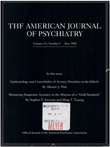Duration of psychosis and outcome in first-episode schizophrenia
Abstract
OBJECTIVE: This study was undertaken to assess the potential effect of duration of untreated illness on outcome in a group of first-episode schizophrenic patients. METHOD: Seventy patients with schizophrenia diagnosed according to the Research Diagnostic Criteria entered the study and were followed for up to 3 years. All patients received standardized treatment and uniform assessments both during the acute phase of their illness and throughout the follow-up period. Outcome was measured in terms of time to remission of acute psychotic symptoms as well as degree of symptom remission. RESULTS: The mean duration of psychotic symptoms before initial treatment was 52 weeks, preceded by a substantial prepsychotic period. According to survival analysis, duration of illness before treatment was found to be significantly associated with time to remission as well as with level of remission. The effect of duration of illness on outcome remained significant when diagnosis and gender variables, themselves associated with outcome, were controlled in a regression analysis. Duration of illness was not correlated with age at onset, mode of onset, premorbid adjustment, or severity of illness at entry into the study. CONCLUSIONS: Duration of psychosis before treatment may be an important predictor of outcome in first-episode schizophrenia. Acute psychotic symptoms could reflect an active morbid process which, if not ameliorated by neuroleptic drug treatment, may result in lasting morbidity. Further implications of these findings are discussed.
Access content
To read the fulltext, please use one of the options below to sign in or purchase access.- Personal login
- Institutional Login
- Sign in via OpenAthens
- Register for access
-
Please login/register if you wish to pair your device and check access availability.
Not a subscriber?
PsychiatryOnline subscription options offer access to the DSM-5 library, books, journals, CME, and patient resources. This all-in-one virtual library provides psychiatrists and mental health professionals with key resources for diagnosis, treatment, research, and professional development.
Need more help? PsychiatryOnline Customer Service may be reached by emailing [email protected] or by calling 800-368-5777 (in the U.S.) or 703-907-7322 (outside the U.S.).



